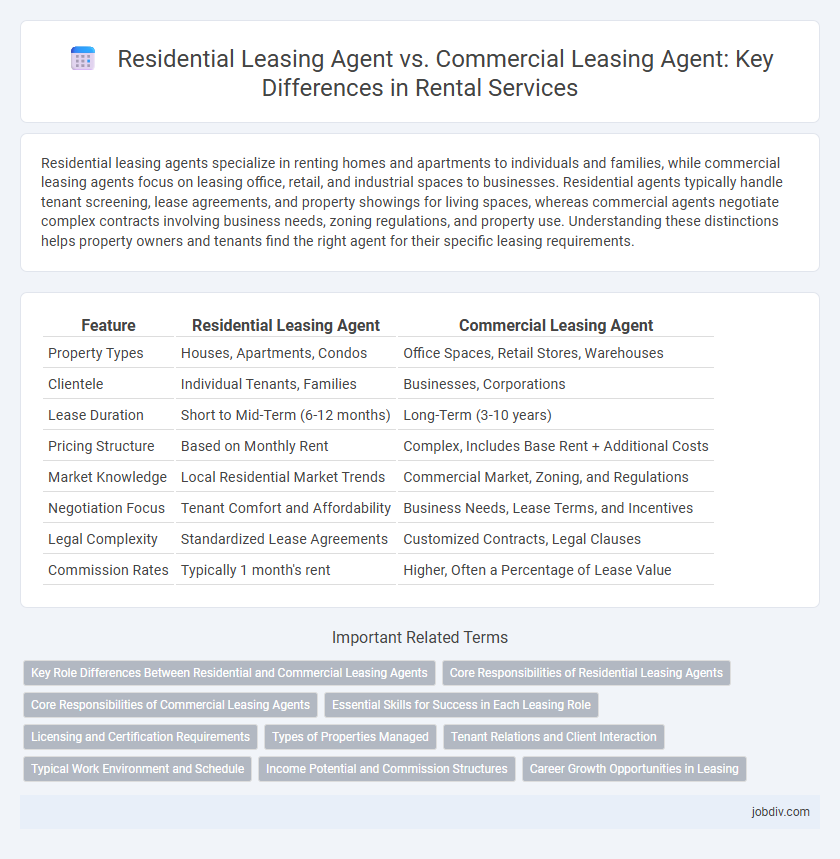Residential leasing agents specialize in renting homes and apartments to individuals and families, while commercial leasing agents focus on leasing office, retail, and industrial spaces to businesses. Residential agents typically handle tenant screening, lease agreements, and property showings for living spaces, whereas commercial agents negotiate complex contracts involving business needs, zoning regulations, and property use. Understanding these distinctions helps property owners and tenants find the right agent for their specific leasing requirements.
Table of Comparison
| Feature | Residential Leasing Agent | Commercial Leasing Agent |
|---|---|---|
| Property Types | Houses, Apartments, Condos | Office Spaces, Retail Stores, Warehouses |
| Clientele | Individual Tenants, Families | Businesses, Corporations |
| Lease Duration | Short to Mid-Term (6-12 months) | Long-Term (3-10 years) |
| Pricing Structure | Based on Monthly Rent | Complex, Includes Base Rent + Additional Costs |
| Market Knowledge | Local Residential Market Trends | Commercial Market, Zoning, and Regulations |
| Negotiation Focus | Tenant Comfort and Affordability | Business Needs, Lease Terms, and Incentives |
| Legal Complexity | Standardized Lease Agreements | Customized Contracts, Legal Clauses |
| Commission Rates | Typically 1 month's rent | Higher, Often a Percentage of Lease Value |
Key Role Differences Between Residential and Commercial Leasing Agents
Residential leasing agents primarily manage rental agreements for apartments, houses, and condominiums, emphasizing tenant screening, lease negotiations, and ensuring compliance with housing laws. Commercial leasing agents specialize in renting office spaces, retail locations, and industrial properties, focusing on market analysis, property valuations, and negotiating complex lease terms tailored to business needs. The distinct legal frameworks, lease durations, and client expectations significantly differentiate the roles and responsibilities of residential and commercial leasing agents.
Core Responsibilities of Residential Leasing Agents
Residential leasing agents primarily manage rental agreements for apartments, houses, and condominiums, focusing on tenant screening, property showings, and lease negotiations. They coordinate move-ins and move-outs while ensuring compliance with local housing laws and regulations. Their responsibilities also include maintaining tenant relationships and handling inquiries related to residential properties.
Core Responsibilities of Commercial Leasing Agents
Commercial leasing agents specialize in securing tenants for office buildings, retail spaces, and industrial properties, negotiating lease terms that optimize revenue for property owners. They conduct market analyses, prepare detailed lease proposals, and coordinate property showings tailored to business requirements. Managing complex contracts and maintaining relationships with corporate clients are key to maximizing occupancy and long-term profitability in commercial real estate.
Essential Skills for Success in Each Leasing Role
Residential leasing agents excel in interpersonal communication, empathy, and knowledge of local housing regulations to effectively match tenants with appropriate homes. Commercial leasing agents require strong negotiation skills, market analysis expertise, and familiarity with zoning laws to secure optimal deals for businesses and property owners. Both roles benefit from proficiency in contract management and customer service to ensure smooth leasing transactions.
Licensing and Certification Requirements
Residential leasing agents typically require a real estate salesperson license, which involves completing state-mandated pre-licensing education, passing a licensing exam, and fulfilling continuing education requirements. Commercial leasing agents often need the same state real estate license but may also pursue specialized certifications such as the Certified Commercial Investment Member (CCIM) designation to demonstrate expertise in commercial property leasing and investment. Licensing and certification standards vary by state and region, impacting the scope of practice and legal compliance for both residential and commercial leasing professionals.
Types of Properties Managed
Residential leasing agents specialize in managing and renting out properties such as single-family homes, apartments, condominiums, and townhouses primarily for individual or family occupancy. Commercial leasing agents handle a diverse portfolio that includes office buildings, retail spaces, industrial warehouses, and mixed-use developments, catering mostly to businesses and corporate clients. The distinct property types require different expertise in market trends, tenant needs, and lease agreements tailored to residential comfort versus commercial operational efficiency.
Tenant Relations and Client Interaction
Residential leasing agents specialize in tenant relations by addressing individual renters' needs, resolving maintenance issues, and ensuring lease compliance to foster long-term occupancy. Commercial leasing agents interact primarily with business clients, negotiating lease terms that align with commercial operations and managing complex contracts to optimize property utilization. Both roles require strong communication skills, but residential agents focus more on personal tenant satisfaction, while commercial agents prioritize strategic client collaboration and market-driven lease agreements.
Typical Work Environment and Schedule
Residential leasing agents typically work in apartment complexes, residential neighborhoods, or property management offices with standard business hours from 9 AM to 5 PM, often accommodating evening or weekend appointments to meet tenant availability. Commercial leasing agents operate in office buildings, retail centers, or industrial properties with flexible schedules that may include irregular hours to align with client needs, property showings, and contract negotiations. Both roles demand frequent site visits and client interactions, but commercial agents often engage in longer negotiation processes and multitask between multiple property types.
Income Potential and Commission Structures
Residential leasing agents typically earn commissions based on a percentage of the monthly rent, often ranging from 50% to 100% of one month's rent per lease, resulting in steadier but lower income potential due to smaller lease values. Commercial leasing agents generally work with higher-value leases and earn commissions calculated as a percentage of the total lease value or annual rent, often between 3% to 6%, leading to significantly higher income potential per transaction. Commission structures in commercial leasing often include residuals or renewals, providing ongoing income streams uncommon in residential leasing.
Career Growth Opportunities in Leasing
Residential leasing agents experience steady career growth through expanding their client networks and specializing in property management, often advancing to property manager or leasing consultant roles. Commercial leasing agents encounter broader career opportunities in negotiating high-value contracts and managing complex commercial properties, leading to positions such as commercial property manager or real estate asset manager. The commercial sector typically offers higher earning potential and diverse specialization areas, enhancing long-term professional development in leasing careers.
Residential Leasing Agent vs Commercial Leasing Agent Infographic

 jobdiv.com
jobdiv.com